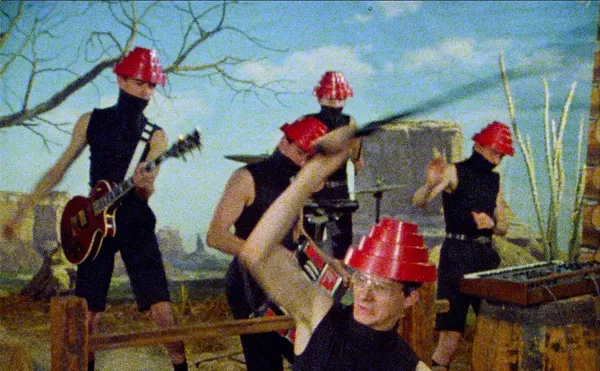“Don’t forget the checky! Can’t produce plays without the checky.” Max Bialystock (Zero Mostel) used to have thousands of investors begging to put their money into one of his Broadway productions, but now he’s reduced to siphoning checks from affection-starved “little old ladies, stopping off at Max Bialystock’s to grab a last thrill on the way to the cemetery.”
In comes wound-too-tight accountant Leo Bloom (Gene Wilder), sent by the agency to balance Max’s books after his last Broadway flop. Leo finds a $2,000 discrepancy and Max pleads for pity, kissing Leo’s tie until he agrees to hide the sum. As Leo speculates out loud, Max’s face blazes with “better days to come” and he repeats Leo’s idea back to him: “You were saying that under the right circumstances, a producer could make more money with a flop than he could with a hit.”
The seed is planted, but first they have to find the worst play ever written, and they have it: Springtime for Hitler — a gay romp with Adolf and Eva at Berchtesgaden.
For director, writer, composer and lyricist Mel Brooks, his first film turned out to be his most inventive and sophisticated, a lone wolf within his signature spoofing of genres. Even so, in 1968 The Producers was panned by critics and audiences (aside from those in New York, Chicago and LA), but was recognized by both the Academy and the Writer’s Guild of America in 1969, garnering awards for best screenplay from each.
The film’s comic and emotional momentum discharges out of a gallery of gags, hunger and (most especially) reactions, as we listen to and watch the report of a crazy, fraudulent and life-affirming idea ricochet from one character to another. And the production lives and breathes with Mostel, one of the most outrageous talents of the 20th century.
Blacklisted in the ’50s, Mostel rebounded in the early ’60s and became a legend on Broadway for his performances in A Funny Thing Happened on the Way to the Forum and Fiddler on the Roof. He could do it all: act, sing, dance; he was a poet of pantomime, a man of extremes. While playing “Tomcat” with his “hold me, touch me” little-old-lady backer, he touches down on all fours, stretch-curves his back inward, licks his hands then smoothes back the hair on each side of his head preparing to purr.
Mostel’s lust for life permeates the whole picture, imbibing everyone involved with an aura of “absolute abandon.” Stakes are pushed to the limit, whether it’s Bloom protecting a swatch of his baby blanket, Lorenzo Saint DuBois (Dick Shawn) pouring his flower-child vulnerabilities and undulations out at the wrong audition or Franz Liebkind (Kenneth Mars) determined to show the world the true Führer, “... the Hitler with a song in his heart.”
What makes a funny movie a masterpiece is when it goes beyond the laughs into the secrets inside all of our hearts, and The Producers is widely and rightly considered one of the best cinematic comedies of all time. Mostel forces us to fall in love with a scoundrel, and Wilder becomes an on-screen conscience, reconsidering the rules that nurture his neurosis, ultimately deciding to live for the first time, outside of his fears: “I want ... I want ... I want everything I’ve ever seen in the movies!”
It’s hard to believe this was only the second film for Wilder (his first being a well-received appearance in Bonnie and Clyde). Playing off Mostel brings out the best in his talents (the two teamed up once again for a 1973 film version of Ionesco’s absurdist play Rhinoceros), culminating in a truly brilliant comic rapport. After Max works Leo into a panic, he throws a glass of water on him: “I’m wet ... I’m wet ... I’m hysterical and I’m wet.” Max slaps him and Leo rasps, “I’m in pain ... and I’m wet ... and I’m still hysterical.” Wilder acts out every nuance of realization, self-analysis and anxiety as he speaks, contrasting and complementing Mostel’s counterreactions.
In essence, The Producers is a love story, a clash of sensibilities that screams and stutters its way into an affair, and ultimately marriage for better or for worse. And this match made in heaven happens to be a couple of Jewish producers who unwittingly make Hitler a hit.
Showing exclusively at the Detroit Film Theatre (inside the DIA, 5200 Woodward Ave., Detroit), Friday through Sunday. Call 313-833-3237.
Anita Schmaltz writes about film for Metro Times. Send comments to [email protected].






